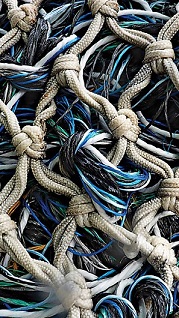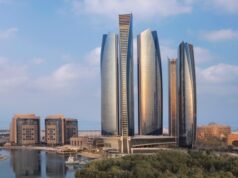 Humanscale has joined the growing list of companies utilizing commercial fishing nets in their products. The company just introduced its Smart Ocean chair that incorporates almost two pounds of recycled fishing net material. Sourced from Bureo, an emerging venture developing innovative solutions to prevent ocean plastic pollution, this is the first tangible product of its new partnership and marks the first product available to purchase from the consortium of companies under the NextWave initiative.
Humanscale has joined the growing list of companies utilizing commercial fishing nets in their products. The company just introduced its Smart Ocean chair that incorporates almost two pounds of recycled fishing net material. Sourced from Bureo, an emerging venture developing innovative solutions to prevent ocean plastic pollution, this is the first tangible product of its new partnership and marks the first product available to purchase from the consortium of companies under the NextWave initiative.
“Fishing nets comprise approximately 10 percent of the plastic pollution in the ocean today,” says Humanscale Founder and CEO Robert King. “Our partnership with Bureo helps further our goal to achieve a net positive impact on our natural environment. The Smart Ocean task chair not only supports the health and comfort of our customers, but actually removes plastic from the ocean, supporting the overall health and well-being of a greater ecosystem.”
The nets used in the production of the new task chair are from Bureo’s Net Positiva recycling program, which facilitates the collection of discarded plastic fishing nets and provides incentives to participating coastal communities. The nets are then transformed into plastic pellets and used to manufacture quality products such as skateboards, sunglasses, and now—for the first time ever—an ergonomic task chair.
Humanscale joins companies such as Aquafil and Interface in helping to transform discarded fishing nets into new, viable products. Aquafil’s creative re-use of commercial fishing nets in their carpet fiber inspired Interface to partner in the development of Net-Works, a program that gathers discarded fishing nets from areas in and around poverty-stricken fishing villages. Interface has partnered with the Zoological Society of London to buy the discarded fishing nets. The nets are recycled into new yarn for carpet tiles by Aquafil. Collecting these enormous nets not only provides “food” for 100 percent recycled content Type 6 Nylon for products, but also protects marine animals in the ocean depths and on the beaches where the nets sometimes wash up. The program also provides a supplementary stream of income for local villagers and allows the ecosystem to regenerate.







